ASS110-2 Research: Divorce Impact on Children's Education Plan
VerifiedAdded on 2023/06/10
|14
|3376
|328
Project
AI Summary
This project investigates the impact of parental divorce on children's education within the Essex region. The research employs a qualitative approach, utilizing semi-structured interviews with healthcare counselors to gather primary data. The study aims to understand how divorce affects children's academic performance, well-being, and overall educational attainment. The methodology includes an inductive research approach, non-probabilistic purposive sampling, and thematic data analysis. Ethical considerations, such as informed consent and data privacy, are addressed. The project concludes that divorce significantly impacts children's education, potentially decreasing their effectiveness and efficiency in learning. This research contributes to understanding the challenges faced by children of divorced parents and highlights the need for support systems to mitigate the negative effects on their educational journey. Desklib provides a platform to explore similar assignments and past papers.
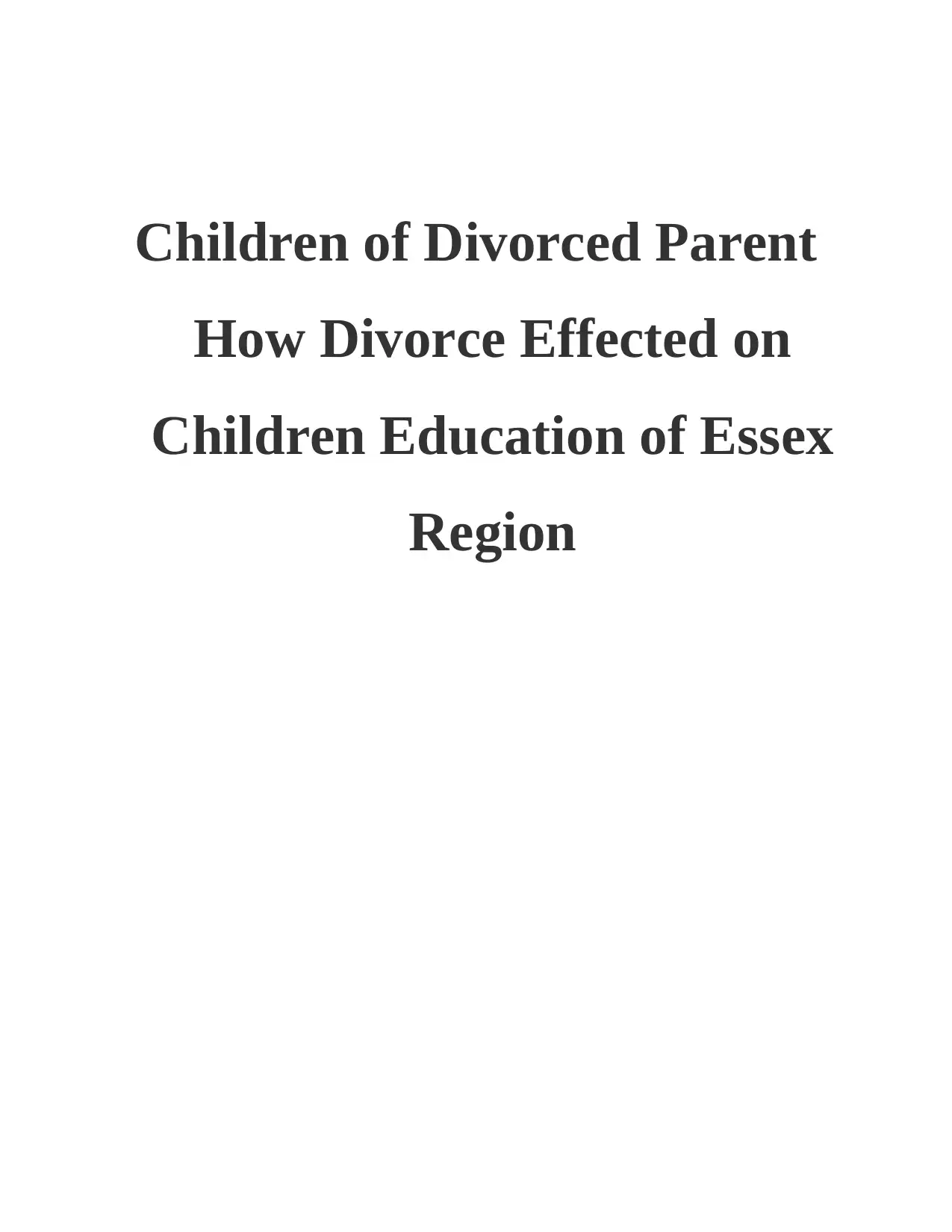
Children of Divorced Parent
How Divorce Effected on
Children Education of Essex
Region
How Divorce Effected on
Children Education of Essex
Region
Paraphrase This Document
Need a fresh take? Get an instant paraphrase of this document with our AI Paraphraser


Table of Contents
CHAPTER 1....................................................................................................................................3
Topic............................................................................................................................................3
Research question........................................................................................................................3
Background..................................................................................................................................3
Justification..................................................................................................................................3
CHAPTER 2....................................................................................................................................3
Literature review..........................................................................................................................3
CHAPTER 3....................................................................................................................................4
Methodology –.............................................................................................................................4
Data Collection –.........................................................................................................................5
Sampling –...................................................................................................................................6
Ethical Consideration –................................................................................................................6
Data Analysis –............................................................................................................................7
CHAPTER- 4...................................................................................................................................7
Conclusion...................................................................................................................................7
REFERENCES................................................................................................................................1
Appendix..........................................................................................................................................3
Questionnaire...............................................................................................................................3
CHAPTER 1....................................................................................................................................3
Topic............................................................................................................................................3
Research question........................................................................................................................3
Background..................................................................................................................................3
Justification..................................................................................................................................3
CHAPTER 2....................................................................................................................................3
Literature review..........................................................................................................................3
CHAPTER 3....................................................................................................................................4
Methodology –.............................................................................................................................4
Data Collection –.........................................................................................................................5
Sampling –...................................................................................................................................6
Ethical Consideration –................................................................................................................6
Data Analysis –............................................................................................................................7
CHAPTER- 4...................................................................................................................................7
Conclusion...................................................................................................................................7
REFERENCES................................................................................................................................1
Appendix..........................................................................................................................................3
Questionnaire...............................................................................................................................3
⊘ This is a preview!⊘
Do you want full access?
Subscribe today to unlock all pages.

Trusted by 1+ million students worldwide
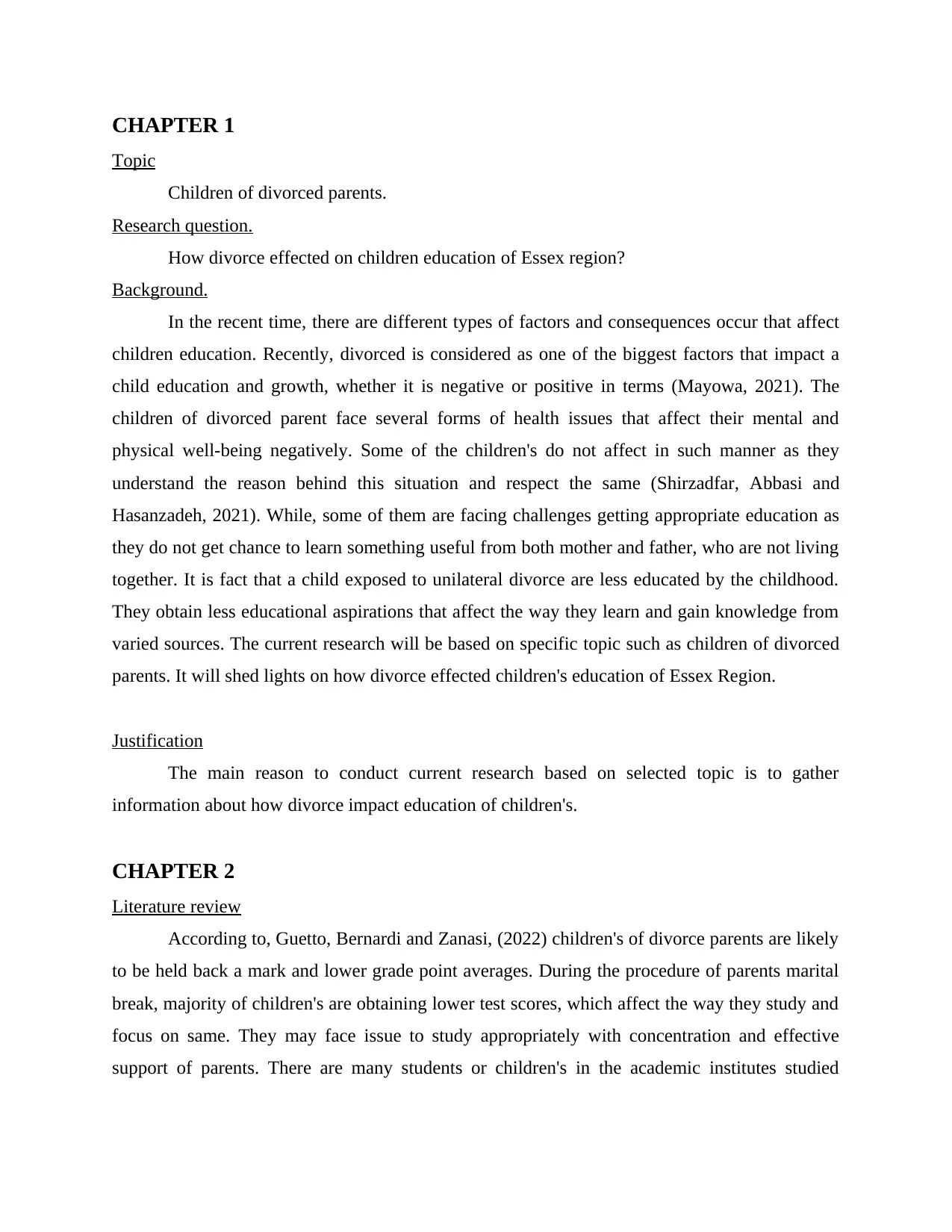
CHAPTER 1
Topic
Children of divorced parents.
Research question.
How divorce effected on children education of Essex region?
Background.
In the recent time, there are different types of factors and consequences occur that affect
children education. Recently, divorced is considered as one of the biggest factors that impact a
child education and growth, whether it is negative or positive in terms (Mayowa, 2021). The
children of divorced parent face several forms of health issues that affect their mental and
physical well-being negatively. Some of the children's do not affect in such manner as they
understand the reason behind this situation and respect the same (Shirzadfar, Abbasi and
Hasanzadeh, 2021). While, some of them are facing challenges getting appropriate education as
they do not get chance to learn something useful from both mother and father, who are not living
together. It is fact that a child exposed to unilateral divorce are less educated by the childhood.
They obtain less educational aspirations that affect the way they learn and gain knowledge from
varied sources. The current research will be based on specific topic such as children of divorced
parents. It will shed lights on how divorce effected children's education of Essex Region.
Justification
The main reason to conduct current research based on selected topic is to gather
information about how divorce impact education of children's.
CHAPTER 2
Literature review
According to, Guetto, Bernardi and Zanasi, (2022) children's of divorce parents are likely
to be held back a mark and lower grade point averages. During the procedure of parents marital
break, majority of children's are obtaining lower test scores, which affect the way they study and
focus on same. They may face issue to study appropriately with concentration and effective
support of parents. There are many students or children's in the academic institutes studied
Topic
Children of divorced parents.
Research question.
How divorce effected on children education of Essex region?
Background.
In the recent time, there are different types of factors and consequences occur that affect
children education. Recently, divorced is considered as one of the biggest factors that impact a
child education and growth, whether it is negative or positive in terms (Mayowa, 2021). The
children of divorced parent face several forms of health issues that affect their mental and
physical well-being negatively. Some of the children's do not affect in such manner as they
understand the reason behind this situation and respect the same (Shirzadfar, Abbasi and
Hasanzadeh, 2021). While, some of them are facing challenges getting appropriate education as
they do not get chance to learn something useful from both mother and father, who are not living
together. It is fact that a child exposed to unilateral divorce are less educated by the childhood.
They obtain less educational aspirations that affect the way they learn and gain knowledge from
varied sources. The current research will be based on specific topic such as children of divorced
parents. It will shed lights on how divorce effected children's education of Essex Region.
Justification
The main reason to conduct current research based on selected topic is to gather
information about how divorce impact education of children's.
CHAPTER 2
Literature review
According to, Guetto, Bernardi and Zanasi, (2022) children's of divorce parents are likely
to be held back a mark and lower grade point averages. During the procedure of parents marital
break, majority of children's are obtaining lower test scores, which affect the way they study and
focus on same. They may face issue to study appropriately with concentration and effective
support of parents. There are many students or children's in the academic institutes studied
Paraphrase This Document
Need a fresh take? Get an instant paraphrase of this document with our AI Paraphraser
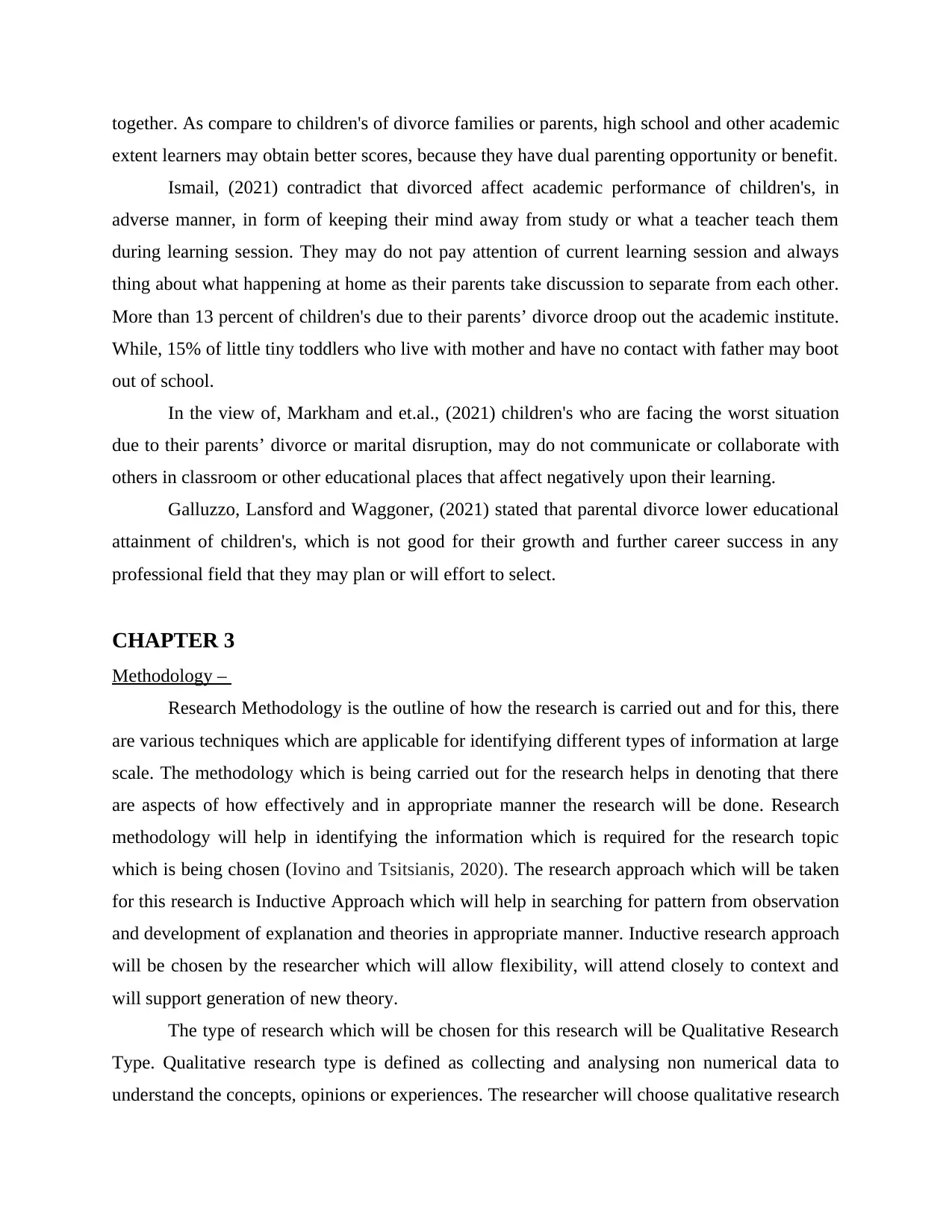
together. As compare to children's of divorce families or parents, high school and other academic
extent learners may obtain better scores, because they have dual parenting opportunity or benefit.
Ismail, (2021) contradict that divorced affect academic performance of children's, in
adverse manner, in form of keeping their mind away from study or what a teacher teach them
during learning session. They may do not pay attention of current learning session and always
thing about what happening at home as their parents take discussion to separate from each other.
More than 13 percent of children's due to their parents’ divorce droop out the academic institute.
While, 15% of little tiny toddlers who live with mother and have no contact with father may boot
out of school.
In the view of, Markham and et.al., (2021) children's who are facing the worst situation
due to their parents’ divorce or marital disruption, may do not communicate or collaborate with
others in classroom or other educational places that affect negatively upon their learning.
Galluzzo, Lansford and Waggoner, (2021) stated that parental divorce lower educational
attainment of children's, which is not good for their growth and further career success in any
professional field that they may plan or will effort to select.
CHAPTER 3
Methodology –
Research Methodology is the outline of how the research is carried out and for this, there
are various techniques which are applicable for identifying different types of information at large
scale. The methodology which is being carried out for the research helps in denoting that there
are aspects of how effectively and in appropriate manner the research will be done. Research
methodology will help in identifying the information which is required for the research topic
which is being chosen (Iovino and Tsitsianis, 2020). The research approach which will be taken
for this research is Inductive Approach which will help in searching for pattern from observation
and development of explanation and theories in appropriate manner. Inductive research approach
will be chosen by the researcher which will allow flexibility, will attend closely to context and
will support generation of new theory.
The type of research which will be chosen for this research will be Qualitative Research
Type. Qualitative research type is defined as collecting and analysing non numerical data to
understand the concepts, opinions or experiences. The researcher will choose qualitative research
extent learners may obtain better scores, because they have dual parenting opportunity or benefit.
Ismail, (2021) contradict that divorced affect academic performance of children's, in
adverse manner, in form of keeping their mind away from study or what a teacher teach them
during learning session. They may do not pay attention of current learning session and always
thing about what happening at home as their parents take discussion to separate from each other.
More than 13 percent of children's due to their parents’ divorce droop out the academic institute.
While, 15% of little tiny toddlers who live with mother and have no contact with father may boot
out of school.
In the view of, Markham and et.al., (2021) children's who are facing the worst situation
due to their parents’ divorce or marital disruption, may do not communicate or collaborate with
others in classroom or other educational places that affect negatively upon their learning.
Galluzzo, Lansford and Waggoner, (2021) stated that parental divorce lower educational
attainment of children's, which is not good for their growth and further career success in any
professional field that they may plan or will effort to select.
CHAPTER 3
Methodology –
Research Methodology is the outline of how the research is carried out and for this, there
are various techniques which are applicable for identifying different types of information at large
scale. The methodology which is being carried out for the research helps in denoting that there
are aspects of how effectively and in appropriate manner the research will be done. Research
methodology will help in identifying the information which is required for the research topic
which is being chosen (Iovino and Tsitsianis, 2020). The research approach which will be taken
for this research is Inductive Approach which will help in searching for pattern from observation
and development of explanation and theories in appropriate manner. Inductive research approach
will be chosen by the researcher which will allow flexibility, will attend closely to context and
will support generation of new theory.
The type of research which will be chosen for this research will be Qualitative Research
Type. Qualitative research type is defined as collecting and analysing non numerical data to
understand the concepts, opinions or experiences. The researcher will choose qualitative research
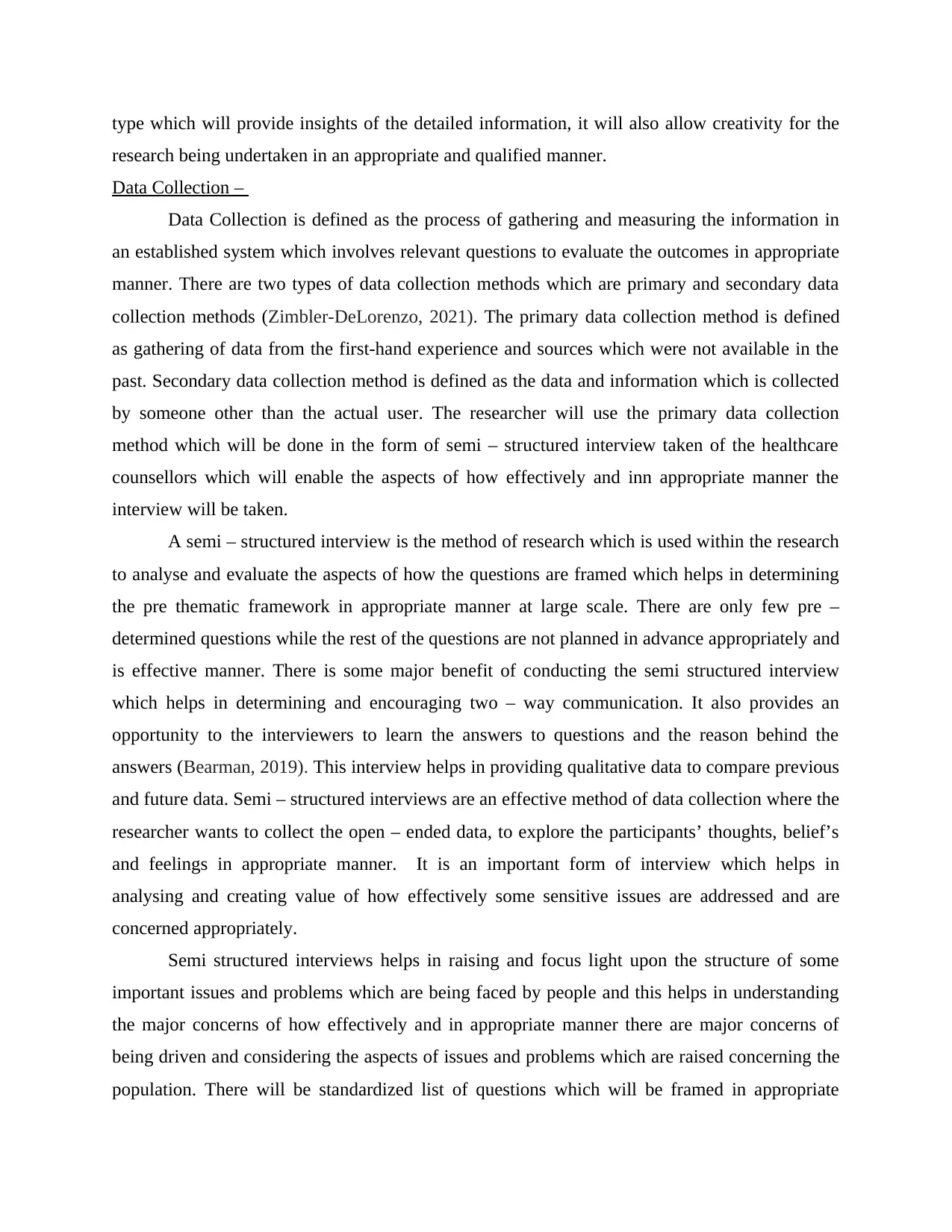
type which will provide insights of the detailed information, it will also allow creativity for the
research being undertaken in an appropriate and qualified manner.
Data Collection –
Data Collection is defined as the process of gathering and measuring the information in
an established system which involves relevant questions to evaluate the outcomes in appropriate
manner. There are two types of data collection methods which are primary and secondary data
collection methods (Zimbler-DeLorenzo, 2021). The primary data collection method is defined
as gathering of data from the first-hand experience and sources which were not available in the
past. Secondary data collection method is defined as the data and information which is collected
by someone other than the actual user. The researcher will use the primary data collection
method which will be done in the form of semi – structured interview taken of the healthcare
counsellors which will enable the aspects of how effectively and inn appropriate manner the
interview will be taken.
A semi – structured interview is the method of research which is used within the research
to analyse and evaluate the aspects of how the questions are framed which helps in determining
the pre thematic framework in appropriate manner at large scale. There are only few pre –
determined questions while the rest of the questions are not planned in advance appropriately and
is effective manner. There is some major benefit of conducting the semi structured interview
which helps in determining and encouraging two – way communication. It also provides an
opportunity to the interviewers to learn the answers to questions and the reason behind the
answers (Bearman, 2019). This interview helps in providing qualitative data to compare previous
and future data. Semi – structured interviews are an effective method of data collection where the
researcher wants to collect the open – ended data, to explore the participants’ thoughts, belief’s
and feelings in appropriate manner. It is an important form of interview which helps in
analysing and creating value of how effectively some sensitive issues are addressed and are
concerned appropriately.
Semi structured interviews helps in raising and focus light upon the structure of some
important issues and problems which are being faced by people and this helps in understanding
the major concerns of how effectively and in appropriate manner there are major concerns of
being driven and considering the aspects of issues and problems which are raised concerning the
population. There will be standardized list of questions which will be framed in appropriate
research being undertaken in an appropriate and qualified manner.
Data Collection –
Data Collection is defined as the process of gathering and measuring the information in
an established system which involves relevant questions to evaluate the outcomes in appropriate
manner. There are two types of data collection methods which are primary and secondary data
collection methods (Zimbler-DeLorenzo, 2021). The primary data collection method is defined
as gathering of data from the first-hand experience and sources which were not available in the
past. Secondary data collection method is defined as the data and information which is collected
by someone other than the actual user. The researcher will use the primary data collection
method which will be done in the form of semi – structured interview taken of the healthcare
counsellors which will enable the aspects of how effectively and inn appropriate manner the
interview will be taken.
A semi – structured interview is the method of research which is used within the research
to analyse and evaluate the aspects of how the questions are framed which helps in determining
the pre thematic framework in appropriate manner at large scale. There are only few pre –
determined questions while the rest of the questions are not planned in advance appropriately and
is effective manner. There is some major benefit of conducting the semi structured interview
which helps in determining and encouraging two – way communication. It also provides an
opportunity to the interviewers to learn the answers to questions and the reason behind the
answers (Bearman, 2019). This interview helps in providing qualitative data to compare previous
and future data. Semi – structured interviews are an effective method of data collection where the
researcher wants to collect the open – ended data, to explore the participants’ thoughts, belief’s
and feelings in appropriate manner. It is an important form of interview which helps in
analysing and creating value of how effectively some sensitive issues are addressed and are
concerned appropriately.
Semi structured interviews helps in raising and focus light upon the structure of some
important issues and problems which are being faced by people and this helps in understanding
the major concerns of how effectively and in appropriate manner there are major concerns of
being driven and considering the aspects of issues and problems which are raised concerning the
population. There will be standardized list of questions which will be framed in appropriate
⊘ This is a preview!⊘
Do you want full access?
Subscribe today to unlock all pages.

Trusted by 1+ million students worldwide
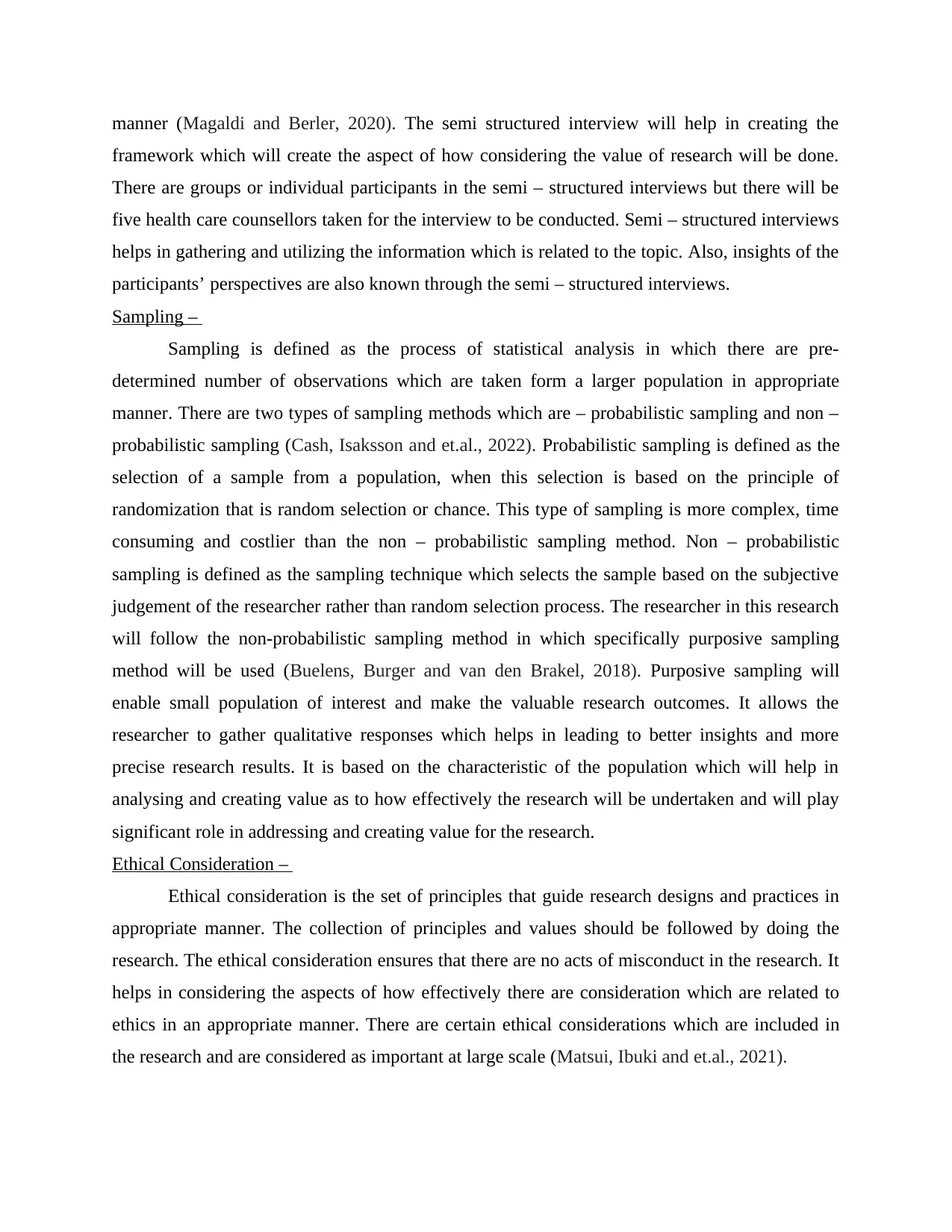
manner (Magaldi and Berler, 2020). The semi structured interview will help in creating the
framework which will create the aspect of how considering the value of research will be done.
There are groups or individual participants in the semi – structured interviews but there will be
five health care counsellors taken for the interview to be conducted. Semi – structured interviews
helps in gathering and utilizing the information which is related to the topic. Also, insights of the
participants’ perspectives are also known through the semi – structured interviews.
Sampling –
Sampling is defined as the process of statistical analysis in which there are pre-
determined number of observations which are taken form a larger population in appropriate
manner. There are two types of sampling methods which are – probabilistic sampling and non –
probabilistic sampling (Cash, Isaksson and et.al., 2022). Probabilistic sampling is defined as the
selection of a sample from a population, when this selection is based on the principle of
randomization that is random selection or chance. This type of sampling is more complex, time
consuming and costlier than the non – probabilistic sampling method. Non – probabilistic
sampling is defined as the sampling technique which selects the sample based on the subjective
judgement of the researcher rather than random selection process. The researcher in this research
will follow the non-probabilistic sampling method in which specifically purposive sampling
method will be used (Buelens, Burger and van den Brakel, 2018). Purposive sampling will
enable small population of interest and make the valuable research outcomes. It allows the
researcher to gather qualitative responses which helps in leading to better insights and more
precise research results. It is based on the characteristic of the population which will help in
analysing and creating value as to how effectively the research will be undertaken and will play
significant role in addressing and creating value for the research.
Ethical Consideration –
Ethical consideration is the set of principles that guide research designs and practices in
appropriate manner. The collection of principles and values should be followed by doing the
research. The ethical consideration ensures that there are no acts of misconduct in the research. It
helps in considering the aspects of how effectively there are consideration which are related to
ethics in an appropriate manner. There are certain ethical considerations which are included in
the research and are considered as important at large scale (Matsui, Ibuki and et.al., 2021).
framework which will create the aspect of how considering the value of research will be done.
There are groups or individual participants in the semi – structured interviews but there will be
five health care counsellors taken for the interview to be conducted. Semi – structured interviews
helps in gathering and utilizing the information which is related to the topic. Also, insights of the
participants’ perspectives are also known through the semi – structured interviews.
Sampling –
Sampling is defined as the process of statistical analysis in which there are pre-
determined number of observations which are taken form a larger population in appropriate
manner. There are two types of sampling methods which are – probabilistic sampling and non –
probabilistic sampling (Cash, Isaksson and et.al., 2022). Probabilistic sampling is defined as the
selection of a sample from a population, when this selection is based on the principle of
randomization that is random selection or chance. This type of sampling is more complex, time
consuming and costlier than the non – probabilistic sampling method. Non – probabilistic
sampling is defined as the sampling technique which selects the sample based on the subjective
judgement of the researcher rather than random selection process. The researcher in this research
will follow the non-probabilistic sampling method in which specifically purposive sampling
method will be used (Buelens, Burger and van den Brakel, 2018). Purposive sampling will
enable small population of interest and make the valuable research outcomes. It allows the
researcher to gather qualitative responses which helps in leading to better insights and more
precise research results. It is based on the characteristic of the population which will help in
analysing and creating value as to how effectively the research will be undertaken and will play
significant role in addressing and creating value for the research.
Ethical Consideration –
Ethical consideration is the set of principles that guide research designs and practices in
appropriate manner. The collection of principles and values should be followed by doing the
research. The ethical consideration ensures that there are no acts of misconduct in the research. It
helps in considering the aspects of how effectively there are consideration which are related to
ethics in an appropriate manner. There are certain ethical considerations which are included in
the research and are considered as important at large scale (Matsui, Ibuki and et.al., 2021).
Paraphrase This Document
Need a fresh take? Get an instant paraphrase of this document with our AI Paraphraser
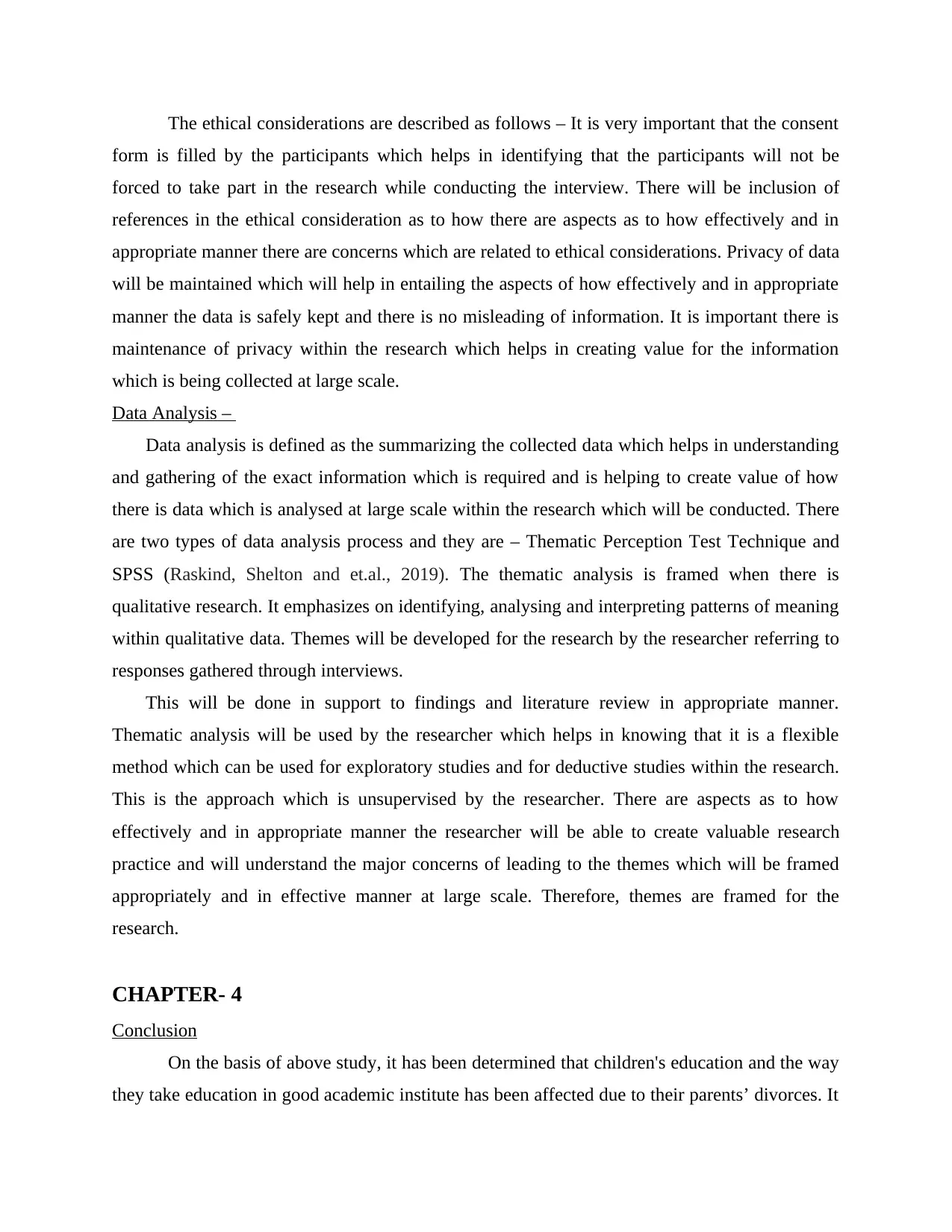
The ethical considerations are described as follows – It is very important that the consent
form is filled by the participants which helps in identifying that the participants will not be
forced to take part in the research while conducting the interview. There will be inclusion of
references in the ethical consideration as to how there are aspects as to how effectively and in
appropriate manner there are concerns which are related to ethical considerations. Privacy of data
will be maintained which will help in entailing the aspects of how effectively and in appropriate
manner the data is safely kept and there is no misleading of information. It is important there is
maintenance of privacy within the research which helps in creating value for the information
which is being collected at large scale.
Data Analysis –
Data analysis is defined as the summarizing the collected data which helps in understanding
and gathering of the exact information which is required and is helping to create value of how
there is data which is analysed at large scale within the research which will be conducted. There
are two types of data analysis process and they are – Thematic Perception Test Technique and
SPSS (Raskind, Shelton and et.al., 2019). The thematic analysis is framed when there is
qualitative research. It emphasizes on identifying, analysing and interpreting patterns of meaning
within qualitative data. Themes will be developed for the research by the researcher referring to
responses gathered through interviews.
This will be done in support to findings and literature review in appropriate manner.
Thematic analysis will be used by the researcher which helps in knowing that it is a flexible
method which can be used for exploratory studies and for deductive studies within the research.
This is the approach which is unsupervised by the researcher. There are aspects as to how
effectively and in appropriate manner the researcher will be able to create valuable research
practice and will understand the major concerns of leading to the themes which will be framed
appropriately and in effective manner at large scale. Therefore, themes are framed for the
research.
CHAPTER- 4
Conclusion
On the basis of above study, it has been determined that children's education and the way
they take education in good academic institute has been affected due to their parents’ divorces. It
form is filled by the participants which helps in identifying that the participants will not be
forced to take part in the research while conducting the interview. There will be inclusion of
references in the ethical consideration as to how there are aspects as to how effectively and in
appropriate manner there are concerns which are related to ethical considerations. Privacy of data
will be maintained which will help in entailing the aspects of how effectively and in appropriate
manner the data is safely kept and there is no misleading of information. It is important there is
maintenance of privacy within the research which helps in creating value for the information
which is being collected at large scale.
Data Analysis –
Data analysis is defined as the summarizing the collected data which helps in understanding
and gathering of the exact information which is required and is helping to create value of how
there is data which is analysed at large scale within the research which will be conducted. There
are two types of data analysis process and they are – Thematic Perception Test Technique and
SPSS (Raskind, Shelton and et.al., 2019). The thematic analysis is framed when there is
qualitative research. It emphasizes on identifying, analysing and interpreting patterns of meaning
within qualitative data. Themes will be developed for the research by the researcher referring to
responses gathered through interviews.
This will be done in support to findings and literature review in appropriate manner.
Thematic analysis will be used by the researcher which helps in knowing that it is a flexible
method which can be used for exploratory studies and for deductive studies within the research.
This is the approach which is unsupervised by the researcher. There are aspects as to how
effectively and in appropriate manner the researcher will be able to create valuable research
practice and will understand the major concerns of leading to the themes which will be framed
appropriately and in effective manner at large scale. Therefore, themes are framed for the
research.
CHAPTER- 4
Conclusion
On the basis of above study, it has been determined that children's education and the way
they take education in good academic institute has been affected due to their parents’ divorces. It
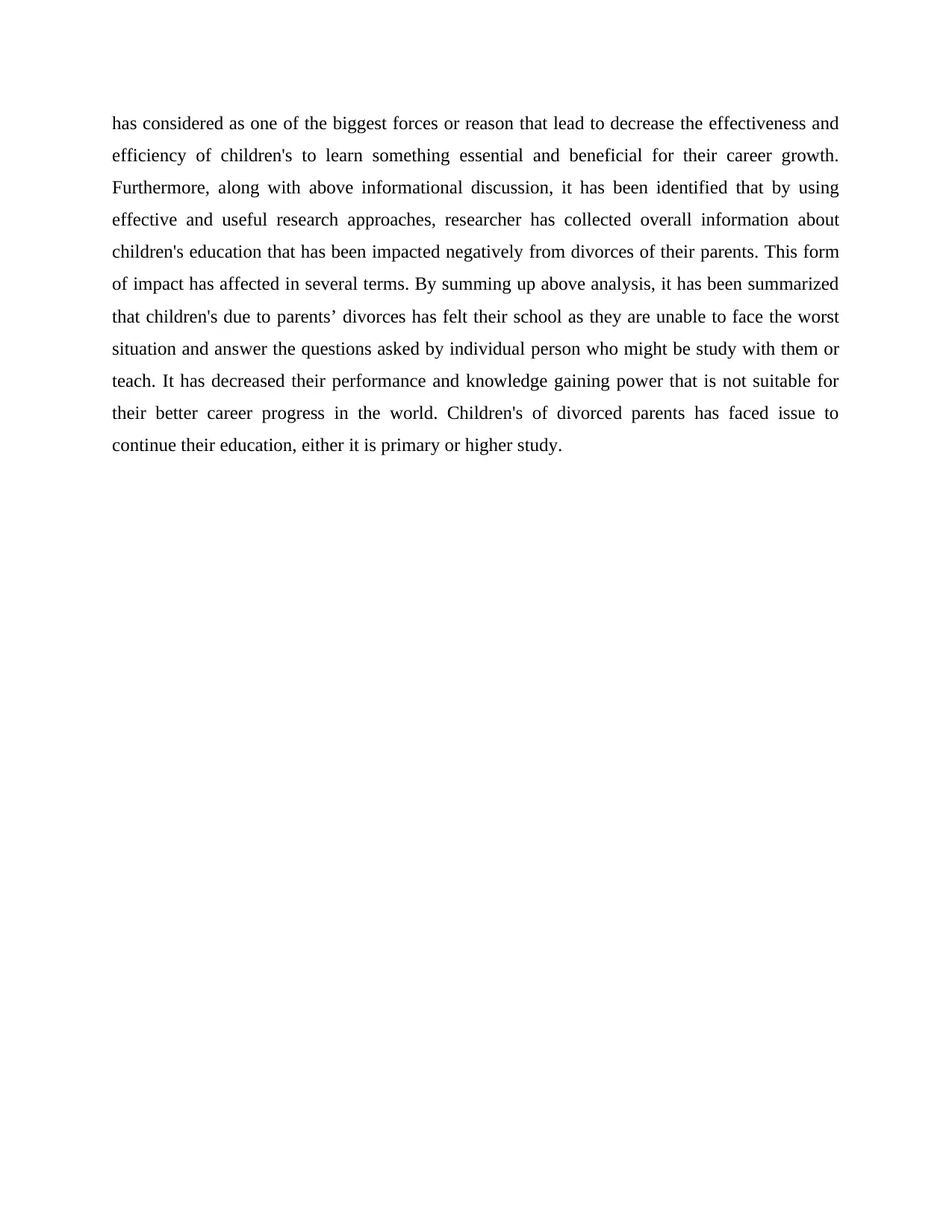
has considered as one of the biggest forces or reason that lead to decrease the effectiveness and
efficiency of children's to learn something essential and beneficial for their career growth.
Furthermore, along with above informational discussion, it has been identified that by using
effective and useful research approaches, researcher has collected overall information about
children's education that has been impacted negatively from divorces of their parents. This form
of impact has affected in several terms. By summing up above analysis, it has been summarized
that children's due to parents’ divorces has felt their school as they are unable to face the worst
situation and answer the questions asked by individual person who might be study with them or
teach. It has decreased their performance and knowledge gaining power that is not suitable for
their better career progress in the world. Children's of divorced parents has faced issue to
continue their education, either it is primary or higher study.
efficiency of children's to learn something essential and beneficial for their career growth.
Furthermore, along with above informational discussion, it has been identified that by using
effective and useful research approaches, researcher has collected overall information about
children's education that has been impacted negatively from divorces of their parents. This form
of impact has affected in several terms. By summing up above analysis, it has been summarized
that children's due to parents’ divorces has felt their school as they are unable to face the worst
situation and answer the questions asked by individual person who might be study with them or
teach. It has decreased their performance and knowledge gaining power that is not suitable for
their better career progress in the world. Children's of divorced parents has faced issue to
continue their education, either it is primary or higher study.
⊘ This is a preview!⊘
Do you want full access?
Subscribe today to unlock all pages.

Trusted by 1+ million students worldwide
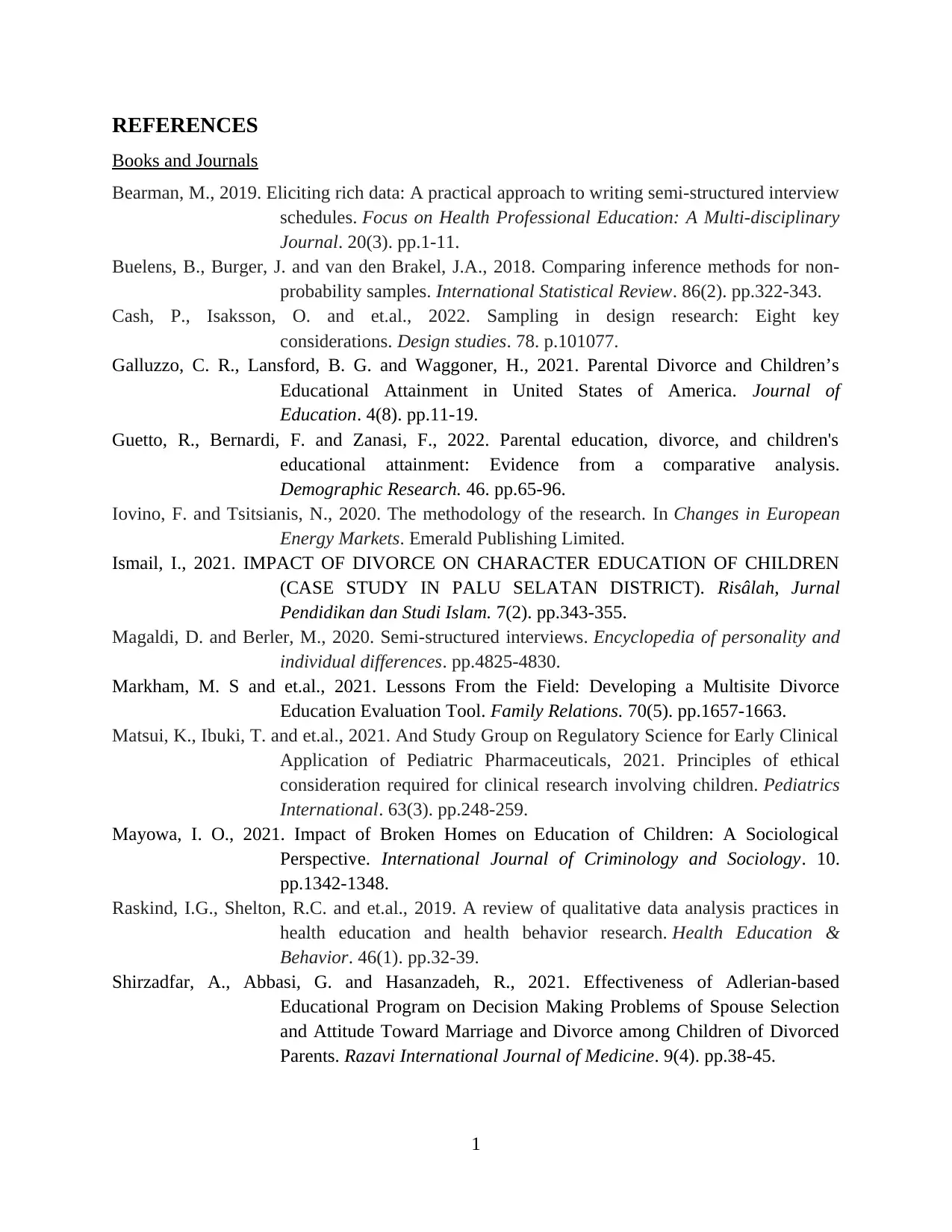
REFERENCES
Books and Journals
Bearman, M., 2019. Eliciting rich data: A practical approach to writing semi-structured interview
schedules. Focus on Health Professional Education: A Multi-disciplinary
Journal. 20(3). pp.1-11.
Buelens, B., Burger, J. and van den Brakel, J.A., 2018. Comparing inference methods for non‐
probability samples. International Statistical Review. 86(2). pp.322-343.
Cash, P., Isaksson, O. and et.al., 2022. Sampling in design research: Eight key
considerations. Design studies. 78. p.101077.
Galluzzo, C. R., Lansford, B. G. and Waggoner, H., 2021. Parental Divorce and Children’s
Educational Attainment in United States of America. Journal of
Education. 4(8). pp.11-19.
Guetto, R., Bernardi, F. and Zanasi, F., 2022. Parental education, divorce, and children's
educational attainment: Evidence from a comparative analysis.
Demographic Research. 46. pp.65-96.
Iovino, F. and Tsitsianis, N., 2020. The methodology of the research. In Changes in European
Energy Markets. Emerald Publishing Limited.
Ismail, I., 2021. IMPACT OF DIVORCE ON CHARACTER EDUCATION OF CHILDREN
(CASE STUDY IN PALU SELATAN DISTRICT). Risâlah, Jurnal
Pendidikan dan Studi Islam. 7(2). pp.343-355.
Magaldi, D. and Berler, M., 2020. Semi-structured interviews. Encyclopedia of personality and
individual differences. pp.4825-4830.
Markham, M. S and et.al., 2021. Lessons From the Field: Developing a Multisite Divorce
Education Evaluation Tool. Family Relations. 70(5). pp.1657-1663.
Matsui, K., Ibuki, T. and et.al., 2021. And Study Group on Regulatory Science for Early Clinical
Application of Pediatric Pharmaceuticals, 2021. Principles of ethical
consideration required for clinical research involving children. Pediatrics
International. 63(3). pp.248-259.
Mayowa, I. O., 2021. Impact of Broken Homes on Education of Children: A Sociological
Perspective. International Journal of Criminology and Sociology. 10.
pp.1342-1348.
Raskind, I.G., Shelton, R.C. and et.al., 2019. A review of qualitative data analysis practices in
health education and health behavior research. Health Education &
Behavior. 46(1). pp.32-39.
Shirzadfar, A., Abbasi, G. and Hasanzadeh, R., 2021. Effectiveness of Adlerian-based
Educational Program on Decision Making Problems of Spouse Selection
and Attitude Toward Marriage and Divorce among Children of Divorced
Parents. Razavi International Journal of Medicine. 9(4). pp.38-45.
1
Books and Journals
Bearman, M., 2019. Eliciting rich data: A practical approach to writing semi-structured interview
schedules. Focus on Health Professional Education: A Multi-disciplinary
Journal. 20(3). pp.1-11.
Buelens, B., Burger, J. and van den Brakel, J.A., 2018. Comparing inference methods for non‐
probability samples. International Statistical Review. 86(2). pp.322-343.
Cash, P., Isaksson, O. and et.al., 2022. Sampling in design research: Eight key
considerations. Design studies. 78. p.101077.
Galluzzo, C. R., Lansford, B. G. and Waggoner, H., 2021. Parental Divorce and Children’s
Educational Attainment in United States of America. Journal of
Education. 4(8). pp.11-19.
Guetto, R., Bernardi, F. and Zanasi, F., 2022. Parental education, divorce, and children's
educational attainment: Evidence from a comparative analysis.
Demographic Research. 46. pp.65-96.
Iovino, F. and Tsitsianis, N., 2020. The methodology of the research. In Changes in European
Energy Markets. Emerald Publishing Limited.
Ismail, I., 2021. IMPACT OF DIVORCE ON CHARACTER EDUCATION OF CHILDREN
(CASE STUDY IN PALU SELATAN DISTRICT). Risâlah, Jurnal
Pendidikan dan Studi Islam. 7(2). pp.343-355.
Magaldi, D. and Berler, M., 2020. Semi-structured interviews. Encyclopedia of personality and
individual differences. pp.4825-4830.
Markham, M. S and et.al., 2021. Lessons From the Field: Developing a Multisite Divorce
Education Evaluation Tool. Family Relations. 70(5). pp.1657-1663.
Matsui, K., Ibuki, T. and et.al., 2021. And Study Group on Regulatory Science for Early Clinical
Application of Pediatric Pharmaceuticals, 2021. Principles of ethical
consideration required for clinical research involving children. Pediatrics
International. 63(3). pp.248-259.
Mayowa, I. O., 2021. Impact of Broken Homes on Education of Children: A Sociological
Perspective. International Journal of Criminology and Sociology. 10.
pp.1342-1348.
Raskind, I.G., Shelton, R.C. and et.al., 2019. A review of qualitative data analysis practices in
health education and health behavior research. Health Education &
Behavior. 46(1). pp.32-39.
Shirzadfar, A., Abbasi, G. and Hasanzadeh, R., 2021. Effectiveness of Adlerian-based
Educational Program on Decision Making Problems of Spouse Selection
and Attitude Toward Marriage and Divorce among Children of Divorced
Parents. Razavi International Journal of Medicine. 9(4). pp.38-45.
1
Paraphrase This Document
Need a fresh take? Get an instant paraphrase of this document with our AI Paraphraser

Zimbler-DeLorenzo, H., 2021. Consistency in data collection: creating operational definitions.
In Exploring Animal Behavior in Laboratory and Field (pp. 19-31).
Academic Press.
2
In Exploring Animal Behavior in Laboratory and Field (pp. 19-31).
Academic Press.
2
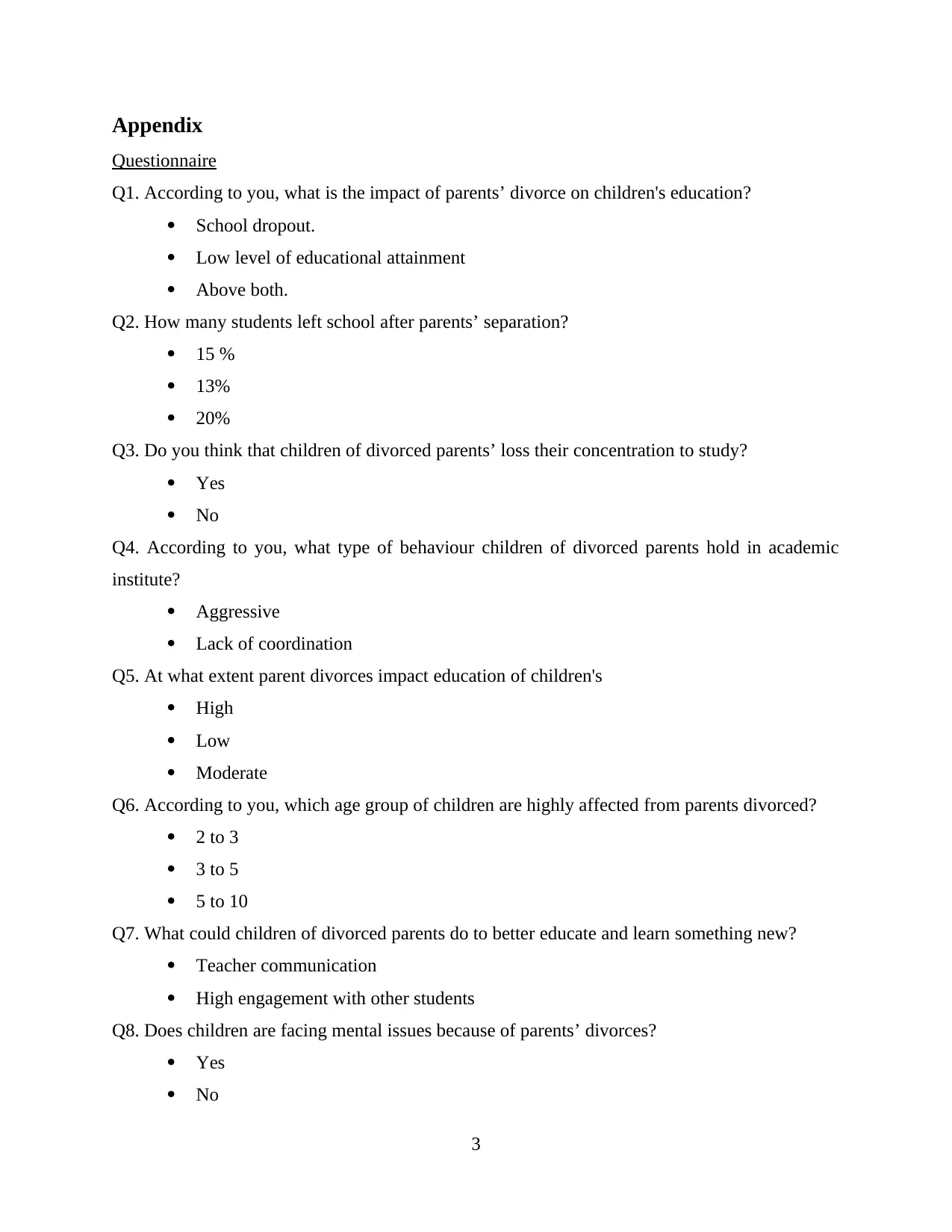
Appendix
Questionnaire
Q1. According to you, what is the impact of parents’ divorce on children's education?
School dropout.
Low level of educational attainment
Above both.
Q2. How many students left school after parents’ separation?
15 %
13%
20%
Q3. Do you think that children of divorced parents’ loss their concentration to study?
Yes
No
Q4. According to you, what type of behaviour children of divorced parents hold in academic
institute?
Aggressive
Lack of coordination
Q5. At what extent parent divorces impact education of children's
High
Low
Moderate
Q6. According to you, which age group of children are highly affected from parents divorced?
2 to 3
3 to 5
5 to 10
Q7. What could children of divorced parents do to better educate and learn something new?
Teacher communication
High engagement with other students
Q8. Does children are facing mental issues because of parents’ divorces?
Yes
No
3
Questionnaire
Q1. According to you, what is the impact of parents’ divorce on children's education?
School dropout.
Low level of educational attainment
Above both.
Q2. How many students left school after parents’ separation?
15 %
13%
20%
Q3. Do you think that children of divorced parents’ loss their concentration to study?
Yes
No
Q4. According to you, what type of behaviour children of divorced parents hold in academic
institute?
Aggressive
Lack of coordination
Q5. At what extent parent divorces impact education of children's
High
Low
Moderate
Q6. According to you, which age group of children are highly affected from parents divorced?
2 to 3
3 to 5
5 to 10
Q7. What could children of divorced parents do to better educate and learn something new?
Teacher communication
High engagement with other students
Q8. Does children are facing mental issues because of parents’ divorces?
Yes
No
3
⊘ This is a preview!⊘
Do you want full access?
Subscribe today to unlock all pages.

Trusted by 1+ million students worldwide
1 out of 14
Related Documents
Your All-in-One AI-Powered Toolkit for Academic Success.
+13062052269
info@desklib.com
Available 24*7 on WhatsApp / Email
![[object Object]](/_next/static/media/star-bottom.7253800d.svg)
Unlock your academic potential
Copyright © 2020–2026 A2Z Services. All Rights Reserved. Developed and managed by ZUCOL.





